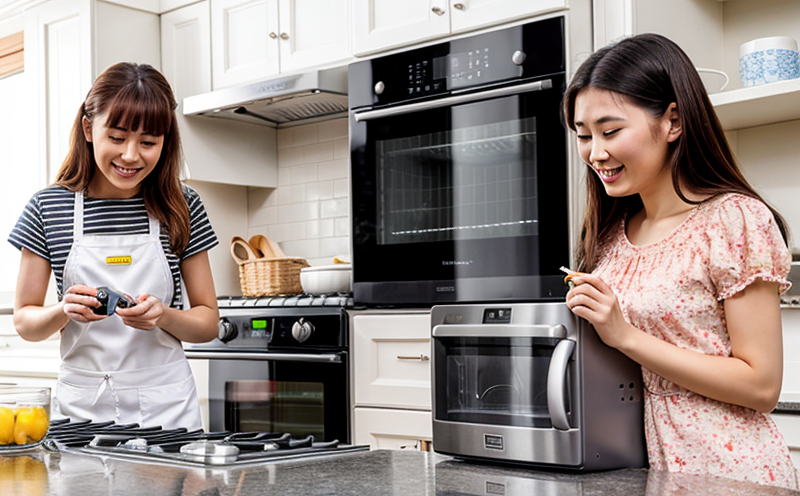Smart Appliance Connectivity and Interoperability Testing
The integration of smart technology into household electrical appliances has transformed home automation and convenience. Smart appliance connectivity testing ensures that these devices work seamlessly together, enhancing user experience and safety. This service focuses on the interoperability between various smart home devices such as refrigerators, ovens, washing machines, and more.
Our comprehensive testing involves evaluating the communication protocols used by appliances to ensure compatibility with other devices in a smart home ecosystem. We use state-of-the-art tools and methodologies to simulate real-world scenarios that these devices encounter daily. This includes testing for data exchange, command response times, error handling, and security measures.
For instance, we might test how a smart refrigerator communicates with an oven when setting a recipe or how a washing machine interacts with a dryer to optimize drying time based on laundry load. These tests are crucial in ensuring that devices from different manufacturers can communicate effectively without causing malfunctions or data loss.
The testing process begins by identifying the key communication protocols used by smart appliances, such as Zigbee, Z-Wave, Bluetooth, and Wi-Fi. We then set up a controlled environment to replicate typical home settings where these devices would operate together. This setup allows us to evaluate not only the technical aspects of connectivity but also the user experience.
One critical aspect of our testing is ensuring that smart appliances can handle complex data exchanges efficiently. For example, when a smart thermostat communicates with a smart HVAC system, it needs to do so without delays or errors. We simulate these scenarios using advanced simulation software and real devices to capture every potential issue.
Safety is paramount in this field. Smart appliances often perform critical functions such as controlling temperature settings or managing power consumption. Any interoperability issues could lead to safety hazards. Our testing ensures that devices operate within their specified limits, even when interacting with other smart home components.
Another important consideration is the security of data exchanged between smart appliances. With increasing concerns about privacy and cybersecurity, it's essential to test for vulnerabilities in communication protocols. We use penetration testing techniques to identify potential security risks and recommend solutions to mitigate them.
To ensure accuracy and reliability, we adhere to international standards such as ISO/IEC 27034-1:2015 for information security management systems related to smart home devices and IEEE P2026™-2020 for interoperability of residential IoT (Internet of Things) applications.
| Test Scenario | Description |
|---|---|
| Data Exchange Efficiency | Evaluating the speed and accuracy of data transfer between smart appliances. |
| Error Handling | Testing how devices respond to unexpected inputs or errors in communication. |
| User Experience Simulation | Recreating typical user interactions with connected devices for optimal performance. |
| Security Vulnerability Assessment | Identifying potential security risks and recommending fixes for smart home ecosystems. |
By offering this service, we help manufacturers ensure that their products integrate smoothly into the broader smart home environment. This not only enhances consumer satisfaction but also promotes safer and more efficient homes.
Benefits
- Ensures seamless communication between different brands of smart appliances.
- Enhances user experience by optimizing device interactions.
- Promotes safety through rigorous testing of critical functions.
- Identifies and mitigates security risks in smart home ecosystems.
- Meets international standards for interoperability and security.
The benefits of our Smart Appliance Connectivity and Interoperability Testing service extend beyond just technical performance. By ensuring that devices from various manufacturers work together flawlessly, we contribute to the overall success of smart home technology. This testing also helps in meeting regulatory requirements and industry standards, thereby protecting consumers and enhancing brand reputation.
Industry Applications
The applications for this service are vast and varied across multiple sectors including electronics manufacturing, home automation, and consumer goods. Below is a table summarizing the key areas where our testing expertise can make a difference:
| Sector | Application |
|---|---|
| Electronics Manufacturing | Testing connectivity between smart devices for seamless integration into home ecosystems. |
| Home Automation | Ensuring interoperability of various smart appliances to create a cohesive user experience. |
| Consumer Goods | Optimizing the performance and safety of connected household items. |
In each sector, our testing service plays an integral role in ensuring that products meet the highest standards of quality and reliability. This is particularly important as smart home technology continues to grow in popularity.





